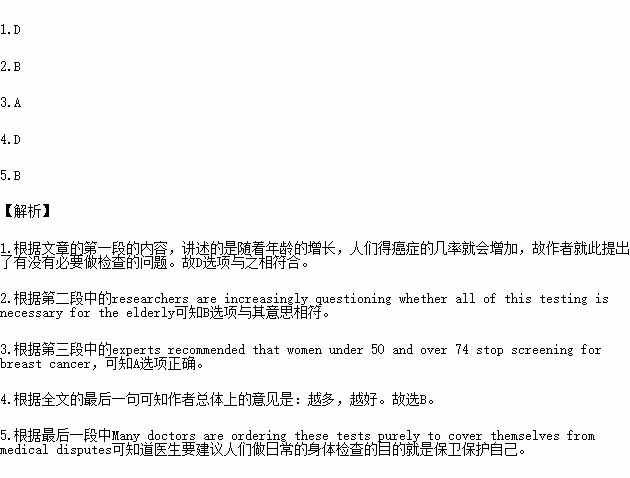题目内容
Our risk of cancer rises rapidly as we age.So it makes sense that the elderly should be routinely screened for new tumors (肿瘤) or doesn’t it?
While such tracking of cancer is a good thing in general, researchers are increasingly questioning whether all of this testing is necessary for the elderly.With the percentage of people over age 65 expected to nearly double by 2050, it s important to weigh the health benefits of screening against the risks and costs of routine testing.
In many cases, screening can lead to additional examinations and operations to remove cancer, which can cause side effects, while the cancers themselves may be slow-growing and may not cause serious health problems in patients’ remaining years.But the message that everyone must screen for cancer has become so ingrained (根深蒂固的) that when health care experts recommended that women under 50 and over 74 stop screening for breast cancer, it caused a noisy reaction among doctors, patients and social groups.
It’s hard to uproot deeply-held beliefs about cancer screening with scientific data.Certainly, there are people over age 75 who have had cancers detected by routine screening, and gained several extra years of life because of treatment.And clearly, people over age 75 who have other risk factors for cancer, such as a family history or previous personal experience with the disease, should continue to get screened regularly.But for the rest, the risk of cancer, while increased at the end of life, must be balanced with other factors like remaining life expectancy.
A recent study suggests that doctors start to make more objective decisions about who will truly benefit from screening—especially considering the explosion of the elderly.
It’s not an easy calculation to make, but one that makes sense for patients.Dr.Otis Brawley said, “Many doctors are ordering these tests purely to cover themselves from medical disputes.We need to think about the wise use of health care, which means making some difficult decisions with elderly patients, and going against the misguided belief that when it comes to health care, more is always better.”
1.Routine cancer screening for the elderly people makes sense because ______.
A.it is believed to contribute to a long life
B.it is part of their health care package
C.they are more sensitive about the health
D.they are in greater danger of tumor growth
2.How do some researchers now look at routine cancer screening for the elderly?
A.It adds too much to their medical bills.
B.They are doubtful about necessity.
C.It helps increase their life expectancy.
D.They think it does more harm than good.
3.What is the traditional view about women screening for breast cancer?
A.It is a must for adult women.
B.It applies to women over 50.
C.It is intended for young women.
D.It doesn’t apply to women over 74.
4.What does the writer say is the general view about health care?
A.Better care, longer life
B.Prevention is better than cure.
C.Better early than late.
D.The more, the better.
5.Why do many doctors advise routine screening for cancer?
A.They want to take advantage of the medical care system.
B.They want to protect themselves against medical disputes.
C.They want data for medical research.
D.They want their patients to suffer less.

